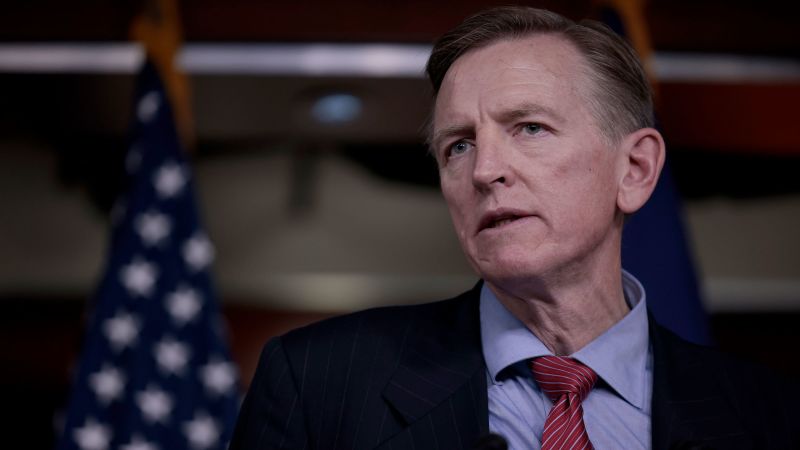Rep. Paul Gosar, a Republican from Arizona, has joined the effort to remove Speaker Mike Johnson from his position, becoming the third member to do so. Along with Reps. Marjorie Taylor Greene and Thomas Massie, there is a motion to vacate the speakership, but no steps have been taken to force a floor vote on the resolution. If Greene decides to move forward with this motion, the House would need to consider it within two legislative days, potentially after the weeklong recess if leadership chooses to do so.
Conservative lawmakers are unhappy with Speaker Mike Johnson due to his proposed foreign aid bills and priorities that align with Democrats. Some have accused Johnson of relying on Democrats to advance bills and giving away Republicans’ leverage on border security. However, the support for ousting the speaker is not universal among GOP hardliners. While some express frustration and disappointment with Johnson’s leadership, others, like Rep. Chip Roy, are more cautious about supporting efforts to remove him, emphasizing the importance of leading and addressing issues like border security.
Despite growing threats to his speakership, Johnson has refused to change the procedure for removing him. He has faced pressure from far-right lawmakers in a heated discussion on the House floor, but has not made any commitments to address their concerns. While prominent conservative lawmakers, including House Freedom Caucus Chairman Bob Good, have criticized Johnson’s handling of foreign aid bills, they are hesitant to support removing him from the speakership before the November election.
Rep. Marjorie Taylor Greene has been one of the key figures in the effort to oust Speaker Johnson, but there is disagreement among Republican hardliners about the timing of such action. Some, like Rep. Dan Bishop, believe that focusing on broader issues within the Republican Conference’s leadership is more important than targeting Johnson specifically. Others, like Rep. Ralph Norman, suggest leaving Johnson in place through the election and addressing the speaker race afterwards. The uncertainty and division within the GOP indicate a complex political landscape leading up to the November election.
The tension within the Republican Party over Speaker Johnson’s leadership highlights broader divisions among conservative lawmakers regarding priorities and strategies. While some are eager to challenge the status quo and express frustration with the lack of action on key issues like border security, others are more cautious about taking drastic measures to remove a sitting speaker. The dynamics within the GOP reflect a broader struggle for influence and control, with implications for the party’s direction and cohesion in the lead-up to the election.
As the situation continues to develop, it remains uncertain how the Republican Party will navigate the internal divisions and disagreements over Speaker Mike Johnson’s leadership. While some lawmakers are pushing for immediate action to remove Johnson, others are advocating for patience and a focus on broader issues within the party. The outcome of this conflict could have significant implications for the GOP’s future direction and priorities as it prepares for the November election. The evolving dynamics within the party suggest a challenging road ahead as Republicans seek to navigate the political landscape and define their path forward.


